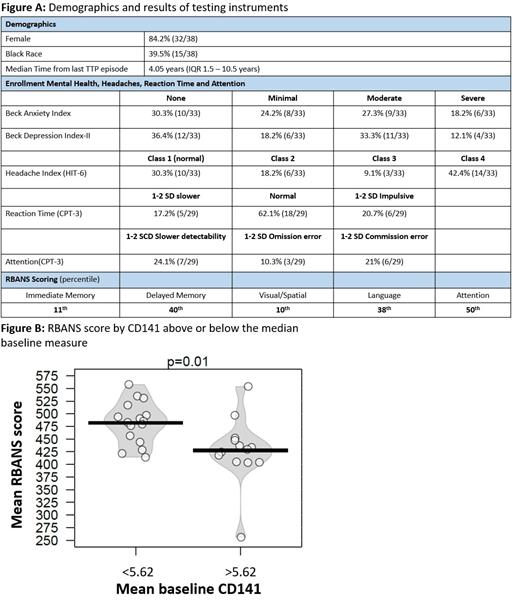Background: High rates of mood disorders and cognitive dysfunction in immune-mediated thrombotic thrombocytopenic purpura (iTTP) survivors have been observed. However, there are no long-term prospective studies to precisely define the proportion of affected patients, rate of progression, and underlying mechanisms. We hypothesized that a large-scale multicenter study is essential to determine the natural history of these complications. Thus, we conducted a multicenter pilot study of iTTP patients in remission to assess feasibility, study design, and explore novel biomarkers. Given ADAMTS13 deficiency during remission is a risk factor for stroke, we also hypothesized that low ADAMTS13 activity predisposes patients to cognitive impairment.
Methods: We aimed to enroll 50 participants from 3 USTMA Consortium sites, prospectively including adult iTTP patients (age ≥ 18 years) in clinical remission (ADAMTS13 remission was not required) for at least 90 days. Diagnosis of iTTP relied on ADAMTS13 activity <10% during an acute TMA episode. Over 2 years, participants underwent comprehensive assessments of mental and physical health, cognition, ADAMTS13 activity, and biomarker sample collection every 3 months. Study assessments included: Beck Anxiety Index (BAI), Beck Depression Index-II (BDI), Headache Impact Test (HIT-6), SF-36v2 (health-related quality of life), and CPT-3 (computer-based assessment of reaction-time, attention, and processing speed). Cognition was assessed annually (entry, year 1 and close) using the Repeatable Battery for the Assessment of Neuropsychological Status (RBANS), with the Montreal Cognitive Assessment (MoCA) substituted the other visits.
Results: Between September 2019 and July 2022, we enrolled 38 of 50 planned participants. Of the 38 enrolled, 16 completed the study (42.1%) 11 were lost to follow up because they did not complete the close-out visit (29%), and 11 have not yet completed the study (29%). After excluding lost subjects, we found that 131 of 221 visits were completed (59%).
Demographics and burden of mental and physical health impairments are shown (Figure A). At enrollment, 45% (15/33) had at least moderate anxiety on BAI, and 45 % (15/33) had at least moderate depression on BDI. HIT-6 revealed69.7 % (23/33) had clinically significant headaches warranting referral to a specialist (median score 57, IQR 47-63). SF-36 found increased fatigue (median fatigue score of 30, population mean 52.15) and pain (median 57.5, population mean 78.77), as well as impairments in social functioning (median 50, population mean 78.77) and general health (median 35, population mean 56.99). The The CPT-3 test (see table) was highly unacceptable to some participants at all sites. RBANS scores at enrollment detected overall cognitive impairment (median score 18 th %ile) with marked deficiencies in immediate memory (median score 11 th %ile), visuospatial construction (median score 10 th %ile), and milder impairments in language and delayed memory with no evidence of attention deficits. We collected several novel biomarkers and observed a correlation between serum CD141 (thrombomodulin) and overall RBANS scores (Figure B) when compared between participants above and below the median baseline CD141. This association was not seen with ADAMTS13, or the other biomarkers collected (Syndecan-1, Vascular adhesion protein-1, E-selectin).
Conclusions: In this pilot study, we found a high attrition rate, likely due to the frequency of study visits and the COVID-19 pandemic. We conclude a larger study is feasible but should account for high attrition, employ less frequent study visits, and avoid unacceptable study assessments to reduce lost subjects. Enrollment findings confirmed previous single-center reports of high prevalence of mental health disorders, reduced physical health, and subtle but measurable cognitive deficits. The CPT-3 test should be excluded from future studies due to poor acceptance.
Surprisingly, we found no association between lower ADAMTS13 activity and cognitive impairment but observed a significant link between serum CD141 and cognitive impairment. These findings suggest CD141 is potentially a sensitive biomarker for risk of cognitive impairment during remission and may suggest a novel mechanism. A longer-term study with more subjects will be essential to fully explore the clinical and therapeutic implications of these findings.
Disclosures
Sukumar:Sanofi Genzyme: Honoraria. Terrell:Sanofi: Consultancy. Cataland:Takeda: Consultancy; Sanofi: Consultancy.


This feature is available to Subscribers Only
Sign In or Create an Account Close Modal